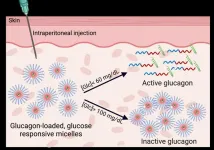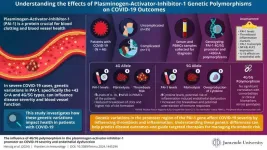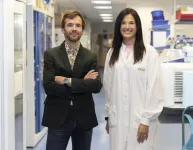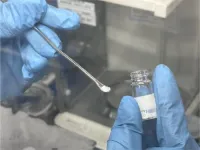Carnegie Mellon University secures ARPA-H award to improve adherence, lower cost of treatment for obesity and Type 2 diabetes patients
2024-10-02
(Press-News.org) PITTSBURGH – A Carnegie Mellon University-led team of researchers has secured an award of up to $34.9 million from the Advanced Research Projects Agency for Health (ARPA-H). The funds will fast track a bioelectronic implant that could radically improve treatment options and significantly reduce the cost of care for patients with obesity and Type 2 diabetes.
The award will drive the accelerated development and testing of “Rx On-site Generation Using Electronics (ROGUE),” a bioelectrical device that hosts a “living pharmacy,” consisting of engineered cells that produce biological therapy to treat Type 2 diabetes and obesity. The device will offer continuous, adjustable, and low-cost therapy deployment via a minimally invasive procedure performed in an outpatient clinic. Additionally, in a stark contrast from the traditional delivery of biologics, it will eliminate the need for weekly injections, trips to the pharmacy, and careful storage of expensive medications.
“This project is the peak deployment of several core technologies we have developed and refined over the past five years, as part of the Bioelectric Medicine Initiative at Carnegie Mellon University,” said Carnegie Mellon University materials science and bioengineer Tzahi Cohen-Karni, who serves as primary investigator on the ARPA-H award. “Bioelectronic devices offer a myriad of benefits, including adjustable therapy delivery, dynamic monitoring, and reduced biologics healthcare costs. We are leveraging our collective strengths to develop an effective and sustainable solution to reduce the burden of chronic care for two global epidemics – obesity and Type 2 diabetes.”
ARPA-H is a federal funding agency established in 2022 to support research that has “the potential to transform entire areas of medicine and health.”
The collaborative team includes 17 co-PIs from Boston University, Georgia Institute of Technology, Northwestern University, Rice University, UC Berkeley, the Mayo Clinic and New York City-based Bruder Consulting and Venture Group. It includes engineers, physicians and multidisciplinary specialists in synthetic biology, materials science, electrical engineering, and other fields.
“The Rice Biotech Launch Pad is determined to facilitate the clinical translation and commercialization of this breakthrough and market disruptive, first-in-class technology,” said Rice University bioengineer Omid Veiseh, co-investigator on the ARPA-H award. “We are developing a minimally invasive implant that can produce a year’s supply of a treatment for chronic diseases like Type 2 diabetes and obesity. With a simple, once-a-year procedure, ROGUE will replace current treatments that have to be administered daily, weekly or monthly.”
This effort is funded under ARPA-H’s REACT program and includes funding for a first-in-human clinical trial for patients facing obesity and Type 2 diabetes. The trial preparation is slated to begin in the fifth year of the six-year project.
###
About Carnegie Mellon University
Carnegie Mellon University is a private, internationally ranked research university with acclaimed programs spanning the sciences, engineering, technology, business, public policy, humanities, and the arts. Our diverse community of scholars, researchers, creators, and innovators is driven to make real-world impacts that benefit people across the globe. With a bold, interdisciplinary, and entrepreneurial approach, we do the work that matters.
About the College of Engineering
The College of Engineering at Carnegie Mellon University is a top-ranked engineering college that is known for our Advanced Collaboration culture in research and education. The College is well-known for working on problems of both scientific and practical importance. Our “maker” culture is ingrained in all that we do, leading to novel approaches and transformative results. Our acclaimed faculty have a focus on innovation management and engineering to yield transformative results that will drive the intellectual and economic vitality of our community, nation, and world.
END
[Attachments] See images for this press release:

ELSE PRESS RELEASES FROM THIS DATE:
2024-10-02
People with diabetes take insulin to lower high blood sugar. However, if glucose levels plunge too low — from taking too much insulin or not eating enough sugar — people can experience hypoglycemia, which can lead to dizziness, cognitive impairment, seizures or comas. To prevent and treat this condition, researchers in ACS Central Science report encapsulating the hormone glucagon. In mouse trials, the nanocapsules activated when blood sugar levels dropped dangerously low and quickly restored glucose levels.
Glucagon is a hormone that signals the liver to ...
2024-10-02
It’s important to eat your veggies, but some essential vitamins and nutrients can only be found in animals, including certain amino acids and peptides. But, in a proof-of-concept study published in ACS’ Journal of Agricultural and Food Chemistry, researchers developed a method to produce creatine, carnosine and taurine — all animal-based nutrients and common workout supplements — right inside a plant. The system allows for different synthetic modules to be easily stacked together to boost production.
Plants can be surprisingly receptive when asked to produce compounds ...
2024-10-02
The American Society of Plant Biologists (ASPB) is excited to announce Pablo Manavella will serve as the next Editor-in-Chief of The Plant Cell. The Plant Cell is a leading international society journal that publishes novel research of special significance in plant biology, especially in the areas of cellular biology, molecular biology, biochemistry, genetics, development, and evolution.
Manavella is currently a Consejo Superior de Investigaciones Científicas (CSIC) researcher at the Institute for Mediterranean and Subtropical Horticulture (IHSM) in Málaga, Spain. He is the Principal Investigator in a lab focusing on the intricate mechanisms regulating ...
2024-10-02
Despite global vaccination efforts, COVID-19 continues to pose significant risks, leading to severe complications and fatalities. These risks are driven by disrupted coagulation, impaired fibrinolysis, which is the process of breaking blood clots, and heightened inflammatory responses. The fibrinolytic system, crucial for maintaining balance within the coagulation cascade, relies on plasmin-mediated fibrin degradation. Plasminogen activators convert plasminogen into plasmin, an enzyme that breaks down ...
2024-10-02
SAN FRANCISCO —PLOS today announced that it has received a $1.5 million grant from the Robert Wood Johnson Foundation and a $1 million grant from the Gordon and Betty Moore Foundation to support our mission to drive Open Science forward with meaningful change in scholarly publishing. The funds enable PLOS to embark on an ambitious 18-month research and design project to explore how to tackle two barriers that exclude many researchers from meaningfully participating in Open Science: affordability ...
2024-10-02
Researchers at the RIKEN Cluster for Pioneering Research (CPR) have developed technology that can alter, within the body, the recognized identity of proteins. The innovation, published in Nature Communications on October 2, allowed researchers to target mouse tumors with a protein and then transport that protein out of the body. This means that cancer-killing drugs could be sent directly to tumors and then excreted from the body after dropping off their payload. The technology also has the potential to allow multi-purpose drugs that can travel from organ to organ, performing ...
2024-10-02
Smoke From Megafires Puts Orchard Trees at Risk
Effects Last Months, Reducing Nut Crop Yields
By Amy Quinton | October 2, 2023
Long-term smoke exposure from massive wildfires lowers the energy reserves of orchard trees and can cut their nut production by half, researchers at the University of California, Davis, found. The smoke can affect trees for months after a megafire, depressing their bloom and the next season’s harvest. This finding reveals a new danger from wildfires that could affect plant health in both agricultural and natural environments.
Nature Plants published ...
2024-10-02
Health Data Research UK (HDR UK) and the National Research Foundation Singapore (NRF) are pleased to have signed a Memorandum of Understanding (MoU) today, that formalises a collaborative partnership in healthcare and data science. The partnership will leverage cutting-edge data science and research, with a focus on trustworthy data use to power improvements in healthcare, research and innovation, strengthening existing links between the UK and Singapore.
The MoU was signed by Permanent Secretary for National Research and ...
2024-10-02
CNIO researchers have discovered that cancer perverts certain brain cells, the astrocytes, and causes them to produce a protein that works in favour of the tumour.
A drug, silibinin, inhibits this protein, and could be used to help treat brain metastasis with immunotherapy. A clinical trial is underway.
The work is published in the American Association for Cancer Research's journal Cancer Discovery.
Researchers at the Spanish National Cancer Research Centre (CNIO) propose a new treatment for brain metastases that respond poorly, or not at all, to immunotherapy, and provide a biomarker to predict ...
2024-10-02
Often overlooked, rechargeable batteries play an important part in contemporary life, powering small devices like smartphones to larger ones like electric vehicles. The keys to creating sustainable rechargeable batteries include having them hold their charge longer, giving them a longer life with more charging cycles, and making them safer. Which is why there is so much promise in all-solid-state batteries.
The problem so far is discovering which solid electrolytes offer such potential advantages.
In a step toward that goal, an Osaka Metropolitan University research group led by Assistant Professor Kota Motohashi, Associate Professor Atsushi Sakuda, ...
LAST 30 PRESS RELEASES:
[Press-News.org] Carnegie Mellon University secures ARPA-H award to improve adherence, lower cost of treatment for obesity and Type 2 diabetes patients





